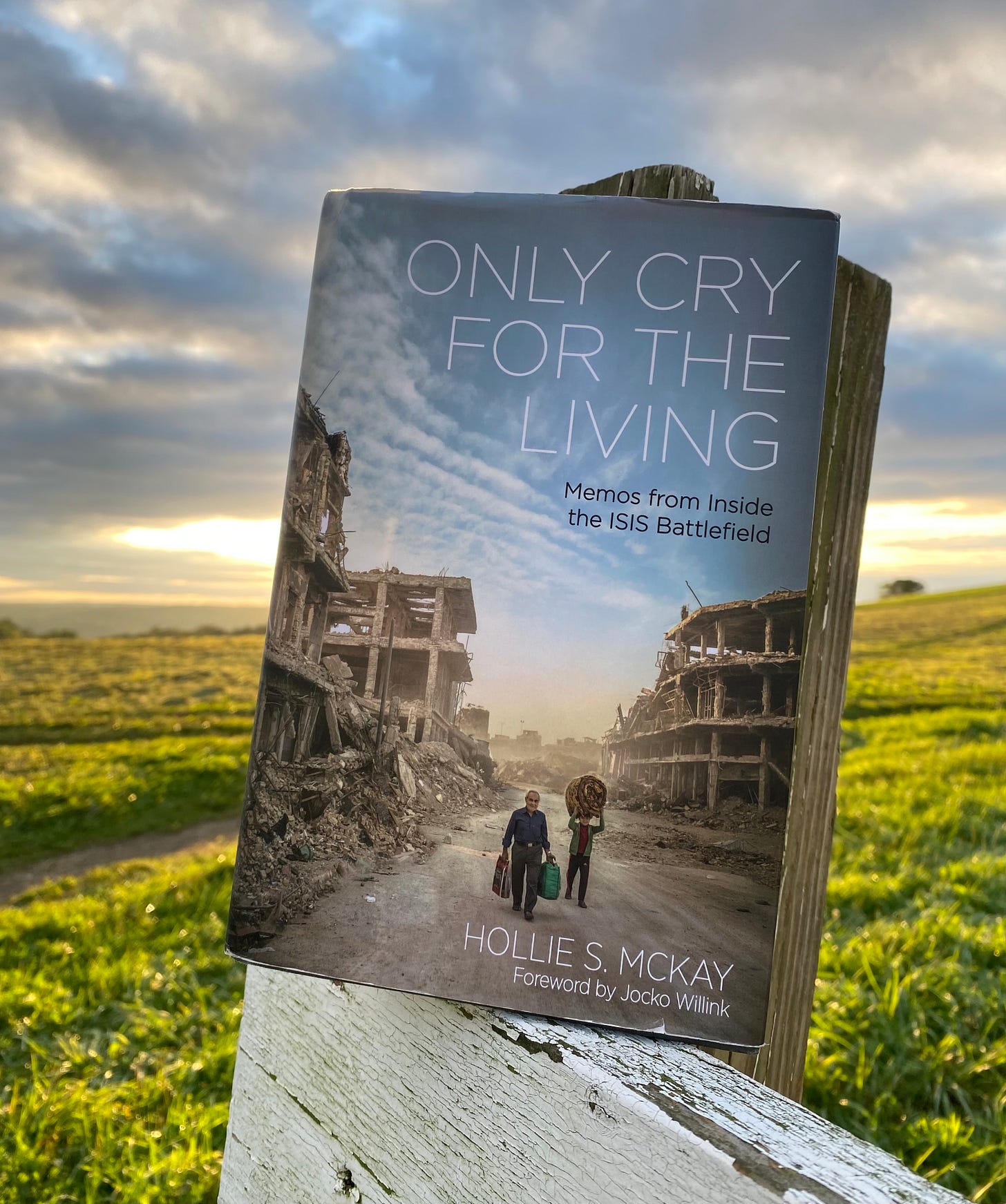“‘Soon, we stop crying for the dead…But all we can do is cry for the living.’ That, too, was war.” - Hollie McKay leveraging a quote from an Iraqi child to answer the question, “What is war?” in her book, Only Cry For the Living: Memos From Inside the ISIS Battlefield.
In a previous post, I addressed the idea that most of us in America exist in a bubble, in that we are separated from the harsh realities of war, breakdowns of infrastructure, and dangers that terrorize many impoverished communities and peoples living in Third World countries. Growing up in middle-class America, I was sheltered from these unfortunate truths, only encountering them briefly through 60-second news clips that displayed the few catastrophes the Modern World deemed as, “important.” I find that this isolation left me stranded in what I call, “The Western World’s Fairytale Facade,” in which those of us in the Developed World are blinded to the starvation, warfare, and lack of resources that afflict millions around the globe — which leads us to believe that all is fine and dandy in the world. In addition to creating our ignorance of current events, this illusion grooms us to overexaggerate trivial daily inconveniences that many in the aforementioned undeveloped nations would deem as extreme luxuries. For example, while we sit on our high-horses, complaining about the slightly overcooked steak, organic chemistry classes, and commuter traffic that are the banes of our privileged existences, countless refugees are emaciated from months of undernourishment and exhausted from fighting for their livelihood.
⁃ “A nurse just begged all parties to end this war, and she was literally on the frontline surrounded by a minefield, couldn’t get doctors, couldn’t get supplies…had a few dozen kids in this clinic that she was just managing to keep alive…[with] these whaling, emaciated babies with their rib cages caved in…the reason you do [war journalism] is to cover [these]effects of war.” - Ben Anderson describing the conditions for civilians and medical professionals in the Yemen War.
They don’t get the opportunity to sit down at a fancy restaurant where they can order as much food as they can fit into their bellies; rather, they struggle to find enough calories to keep themselves alive. They don’t have the chance to attend college and pursue their passions; instead, they spend their time learning how to survive surrounded by violence and peril. They don’t have the option of working a boring 9 to 5 because finding water, food, and shelter, are the only jobs they have time for. Meanwhile, we go about our days calling ourselves, “good people,” as if millions of others across the ocean aren’t fighting for their lives in war-torn nations and living without basic human necessities.
“It’s so hard when you look at the rest of the world and you see these horrific conditions, and you see warlords in power, and you see atrocities being committed, and we’re sitting over here…in the valley, watching it on internet and drinking Starbucks.” -Joe Rogan addressing the gaping difference in life between First and Third World nations.
Now, I should mention that I am as guilty as anybody else of this ignorance. In particular, I find myself recognizing the absurd difference in the quality of life between the Western and Third worlds when I visit the grocery store and remember stories of famished civilians in places like Yemen or Sudan as I walked through aisles upon aisles of packed shelves. “What the fuck is wrong with us?” I think as I contemplate and compare our surplus with much of the world’s starvation; yet, whether it be 10 minutes, a few hours, or even a few days, these thoughts eventually fade from my mind as I return to the previously mentioned facade that is life in America. For this reason, I aim to continuously expand my understanding of life in other nations to remind myself that the world that I know is not the World in its entirety.
If you too are interested in unearthing the realities of places like Syria, Yemen, Iraq, etc., as well as how the U.S. impacts the conditions in these places, here are some of the best books and podcasts I have encountered on my journey to look beyond the Western World’s Fairytale Facade.
Although politicians and political fans alike often have an abundance of views and impressions on current events in places like Africa and the Middle East, I find that spectators commenting from across the pond are not the best sources for information regarding these events; instead, I find that it is those actually walking the frontlines, traversing refugee camps, and engaging with the people in these communities that provide the purest and most impactful perspectives on these topics. So, I present you with the work of war journalists Hollie McKay and Ben Anderson both of whom dedicate their lives to covering the disregarded and unspoken tragedies and occurring around the world; additionally, I give you The UnravelingPodcast, in which Jocko Willink and Darryl Cooper, retired Navy SEAL officer and researcher/writer respectively, spend episodes1-7 discussing the former’s experience serving in the Iraq War. I value each of these individuals greatly, not only because their content is gripping and entertaining, but because none of them shy away from exposing raw stories from the events and places that they cover.
“The Syrian War has been very well covered, every crime has been very well documented…has it made any difference whatsoever? I’m not sure.” - Anderson questioning the impact of war journalism.




